East Africa
Ethiopia
Ethiopia, located in the Horn of Africa, is a country with a rich history as one of the world’s oldest continuous civilizations and the birthplace of coffee.
East Africa
Ethiopia, located in the Horn of Africa, is a country with a rich history as one of the world’s oldest continuous civilizations and the birthplace of coffee.
Population: 123,771,000
Main Religion: Christianity
Christians: 74,679,000 (60%)
Community upliftment projects, such as farming
Ethiopia is a landlocked country on the Horn of Africa. Situated completely within the tropical latitudes, it is relatively compact, with similar north-south and east-west dimensions. The capital, Addis Ababa (“New Flower”), is located almost at the centre of the country. Ethiopia is the largest and most populated country in the Horn of Africa. With the 1993 secession of Eritrea, its former province along the Red Sea, Ethiopia became landlocked. Ethiopia is one of the world’s oldest countries, its territorial extent having varied over the millennia of its existence. In ancient times it remained centred on Aksum, an imperial capital located in the northern part of the modern state, about 100 miles (160 km) from the Red Sea coast. (Brittanica)
Ethiopia has a federal parliamentary republic lead by Prime Minister Abiy Ahmed Ali. The 2018 appointment of Prime Minister Abiy Ahmed set off a transitional period in Ethiopia. Abiy pledged to reform Ethiopia’s authoritarian state and has held elections and implemented some liberalization policies. However, Ethiopia remains beset by internal conflict and intercommunal violence. There are reports of abuses by security forces and according to Freedom House, violations of due process are common, and many restrictive laws remain in force.
In November 2020, a disagreement between the ethnic-based party Tigray People’s Liberation Front (TPLF) and the federal government led to a major conflict, which the government called a “law and enforcement operation”. TPLF was removed from regional government and a transitional caretaker government was established by the parliament. Conflict continued and spread to Tigray, Amhara and Afar regions, adversely affecting internally displaced persons (IDPs) until 2022, when a peace agreement was brokered. The fighting in the Amhara, Oromia, and Tigray regions in recent years has caused widespread displacement, and credible allegations of atrocity crimes have emerged. It is also important to note that there are conflicts in the Oromo and Amhara regions resulting in death, destruction and displacement of civilians.
According to Freedom House, political, social, and religious content has been blocked, networks deliberately disrupted, and – particularly around the war in Tigray – online discussion manipulated by the government and other commentators.
(Sources: Brittanica, CIA factbook, Freedom House)
Freedom House’s 2023 report states: The Ethiopian constitution guarantees religious freedom, and different faith groups have coexisted in the country for centuries. However, religion has increasingly become a divisive factor in Ethiopian politics, and local conflicts have featured violence along religious lines.
The government has been accused of involving itself in religious matters, especially as the EOC faced a split in 2023. In January, members in Oromia formed a new synod; lethal clashes between rival groups and security forces followed before a reconciliation was reached in February. The EOC had criticized Abiy in early February amid accusations that the government was backing the Oromia synod. In August, authorities detained seven bishops from the breakaway synod who did not support reconciliation.
Open Doors reports: Non-traditional Christian groups endure the harshest violations from both local authorities and the Ethiopian Orthodox Church (EOC), especially in areas where EOC is very dominant. Converts to Christianity from Islam, especially in the eastern and south-eastern regions, and ‘cross-denominational converts’ from Orthodox backgrounds face significant pressure from their families and communities. In certain areas, Christians are denied access to community resources and face social ostracization. For instance, regions like the Somali state and parts of Oromia are prone to attacks on churches. Moreover, the ongoing political violence in the country over the last three years has exacerbated the vulnerability of Christians, exposing them to increased pressure and violence in Tigray, Oromia and Amhara regions

 East Africa
East Africa